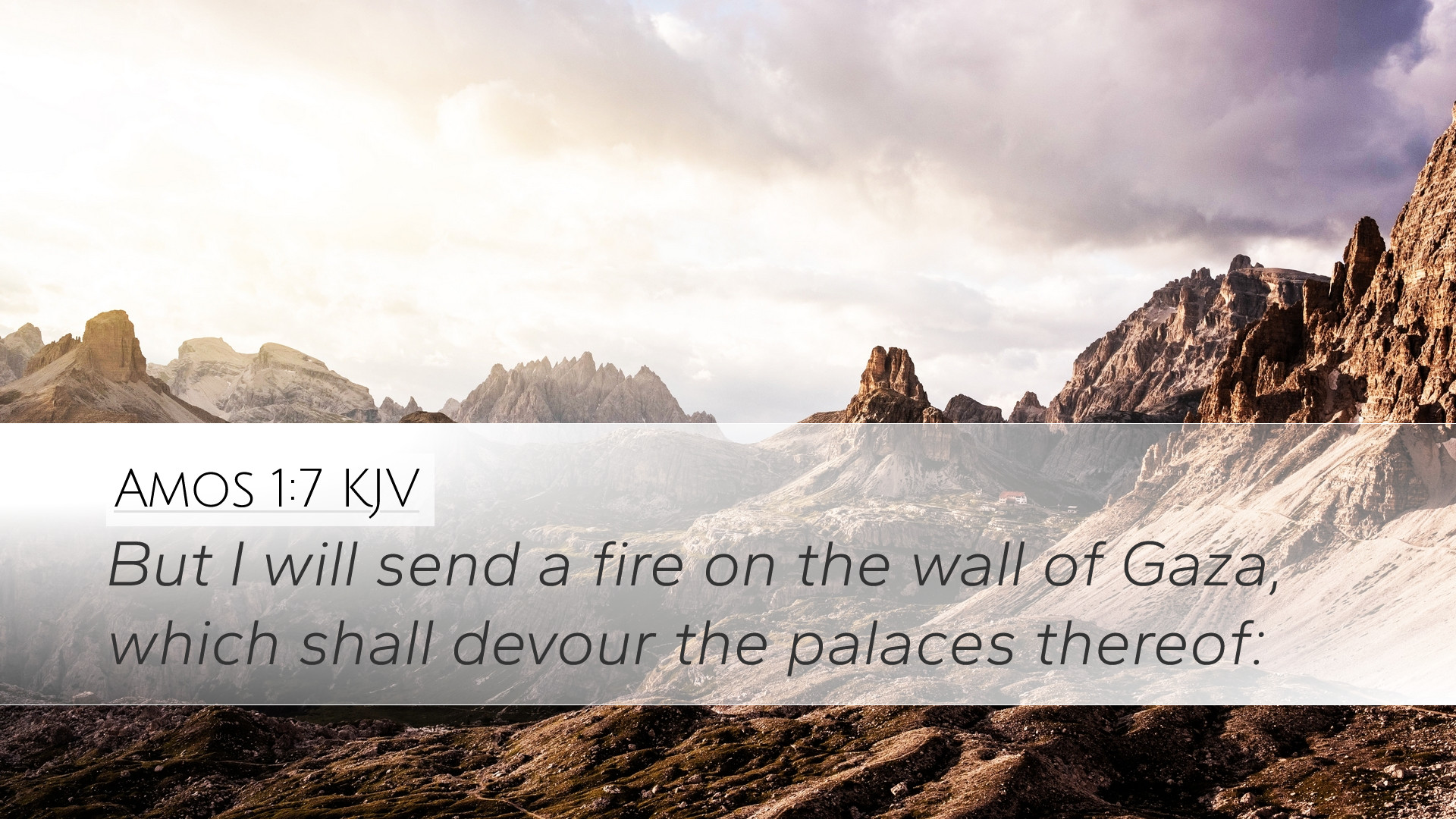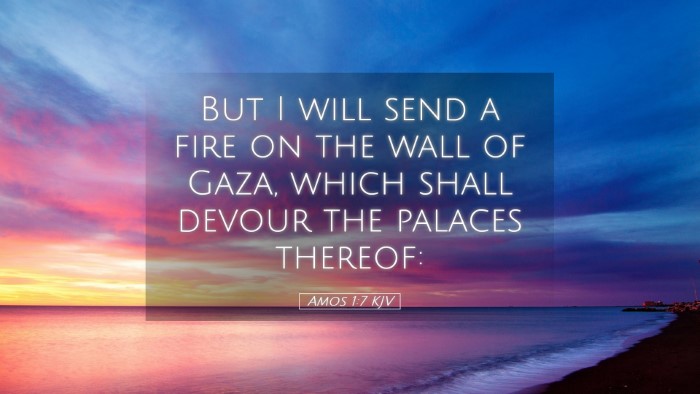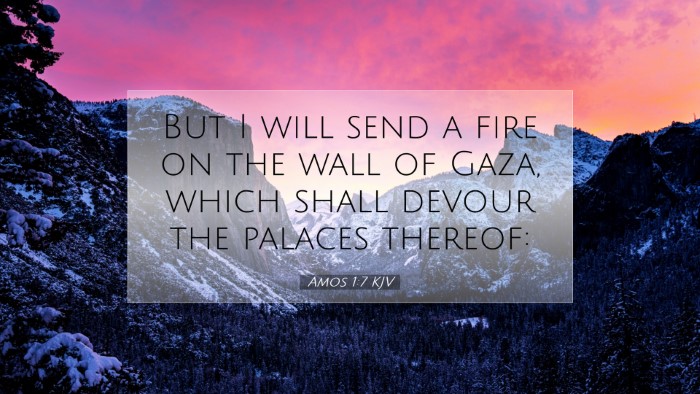Old Testament
Genesis Exodus Leviticus Numbers Deuteronomy Joshua Judges Ruth 1 Samuel 2 Samuel 1 Kings 2 Kings 1 Chronicles 2 Chronicles Ezra Nehemiah Esther Job Psalms Proverbs Ecclesiastes Song of Solomon Isaiah Jeremiah Lamentations Ezekiel Daniel Hosea Joel Amos Obadiah Jonah Micah Nahum Habakkuk Zephaniah Haggai Zechariah MalachiAmos 1:7
Amos 1:7 KJV
But I will send a fire on the wall of Gaza, which shall devour the palaces thereof:
Amos 1:7 Bible Commentary
Commentary on Amos 1:7
Verse: "But I will send a fire on the walls of Gaza, which shall devour the palaces thereof."
Introduction
The verse from Amos 1:7 serves as a prophetic declaration regarding God's judgment on Gaza. This text is significant both for its historical context and its theological implications. The prophetic voice of Amos, a shepherd from Judah, resonates with the themes of divine justice and the inevitable judgment on nations that oppress God's people.
Contextual Analysis
The Book of Amos is set against a backdrop of prosperity in Israel during the 8th century BC. However, this prosperity was marred by social injustice, idolatry, and moral decay. Amos begins his prophecy with a series of messages concerning neighboring nations, and Gaza, an important Philistine city, is first in line to receive the prophet's condemnation.
Historical Background
The Philistines were longstanding enemies of Israel, and Gaza was one of their principal cities, known for its wealth and strategic location. The message concerning Gaza underscores God's sovereignty over all nations, including those that seemed powerful and invulnerable at the time.
Literary Structure
Amos employs a clear structure in his prophecies against the nations, often introducing each condemnation with the phrase, "For three transgressions... and for four." This not only emphasizes the completeness of their sins but also builds a case for divine retribution. The mention of fire as a metaphor for judgment highlights the destructive power of God’s wrath and serves as a vivid image for the impending doom that awaited Gaza.
Theological Insights
The Nature of Divine Judgment
Matthew Henry articulates that the mention of fire symbolizes the purifying aspect of God's judgment. Fire consumes, but it also refines; thus, the judgment on Gaza was not solely punitive but also served the divine purpose of cleansing. This notion challenges the reader to reflect on the nature of God's dealings with nations and individuals alike, emphasizing that divine judgment is always inherently tied to justice.
God's Sovereignty Over Nations
Albert Barnes notes that God's acknowledgment of sin among the neighboring nations, such as Gaza, reveals His universal moral governance. God's sovereignty asserts that He is not only the God of Israel but also the Judge of all earth. This global perspective on God's justice is vital for understanding the message of Amos, as it reflects the omnipresent authority of God over both Israel and its enemies.
The Symbolism of Fire
Adam Clarke elaborates on the symbolism of fire in this verse, associating it with a powerful judgment that leads to total destruction. In the ancient Near Eastern context, cities and their fortifications were a source of pride and security, and the prophecy against Gaza illustrates the fragility of human power when faced with divine intervention. Such imagery serves as a warning about the permanence of God's judgment and the transient nature of earthly authority.
Application for Today
The implications of Amos 1:7 extend beyond its historical context to provide profound lessons for contemporary readers, including pastors, theologians, and students of scripture.
- Understanding God’s Justice: The verse serves as a reminder that God's justice is not limited to His covenant people. It compels us to recognize the sinfulness within our society and the consequences that may ensue from neglecting moral righteousness.
- The Holiness of God: The nature of God's judgment shown through the imagery of fire calls for a deeper reverence for His holiness. It encourages believers to reflect on the purity of their own lives and the lives of their communities.
- Global Perspective: As God pronounces judgment on Gaza, it instills in believers a sense of duty toward addressing injustices not only in their immediate context but also internationally. The prophetic voice challenges contemporary believers to consider how they stand against oppression and sin in their own communities.
Conclusion
Amos 1:7 encapsulates a critical dimension of prophetic literature, encapsulating themes of judgment, divine sovereignty, and moral accountability. The fiery declaration against Gaza not only served as a historical warning but continues to resonate as a profound reminder of God’s unyielding justice in a world that often forgets His moral standards. It calls forth a response from those who claim to follow Him, urging them to act justly, love mercy, and walk humbly with their God.


